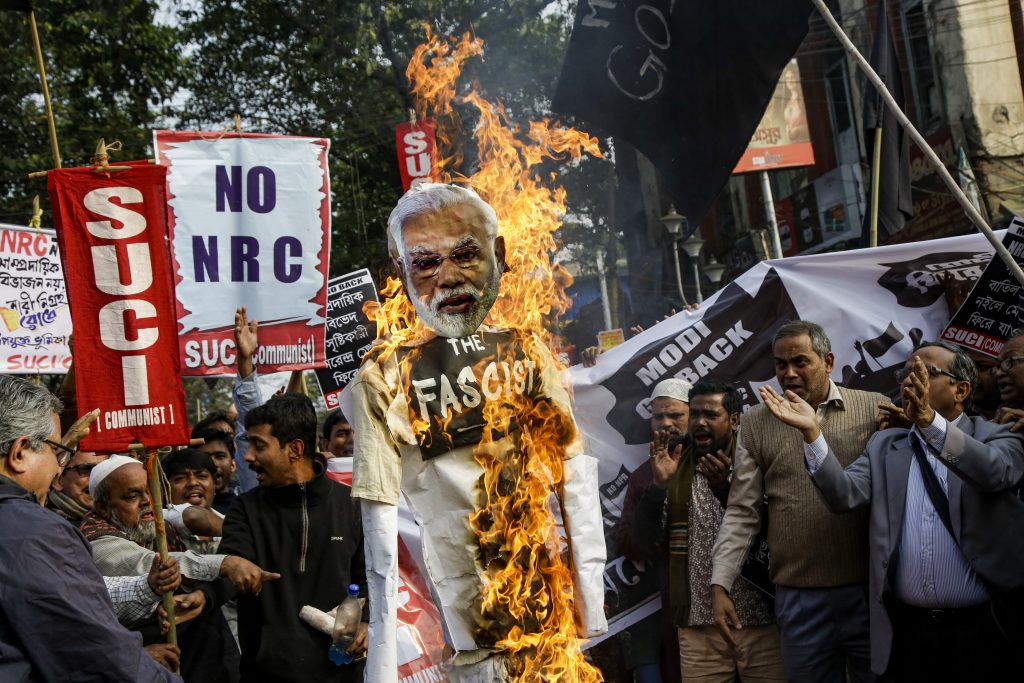14/01/2020
14/01/2020

NEW DELHI, Jan 13, (AP): The head of Indian Prime Minister Narendra Modi’s Hindu nationalist Bharatiya Janata Party in the state of West Bengal has threatened to shoot and jail people who protest a new citizenship law that has triggered a month of nationwide demonstrations. Dilip Ghosh, a member of India’s Parliament and the president of the BJP in West Bengal, made the comments to party members on Sunday in a district of the state that borders Bangladesh.
Cabinet Union Minister Babul Supriyo distanced the BJP from Ghosh’s comments, calling them “very irresponsible” on Twitter on Monday. The citizenship law provides a path to naturalization for people from Bangladesh, Afghanistan and Pakistan, unless they’re Muslim. Many Indians worry the law will be used in conjunction with a National Register of Citizens that could require all Indians to produce documents proving their origins, a challenge in a country where many people lack official records including birth certificates.
Ghosh called out West Bengal’s chief minister, Mamata Banerjee of the opposition All India Trinamool Congress party, comparing her government’s treatment of protesters to BJP-controlled governments in other Indian states. Banerjee, one of several state chief ministers from opposition parties who have pledged not to comply with the citizenship law, has led massive street marches to protest it. “Look at Assam, Uttar Pradesh and Karnataka, our government has shot these demons like dogs,” Ghosh said.
Beat
“You will come here, eat our food, stay here and then damage property? We will beat you with (batons), shoot you and put you in jail,” he said, referring to demonstrators in West Bengal. Twenty-three people have been killed nationwide since the citizenship law was passed Dec 11. Massive protests erupted across the country, with Uttar Pradesh, Karnataka and Assam states the hardest hit. Police in Assam have acknowledged fatally shooting five people, and Karnataka authorities offered compensation to the families of two men killed by police during protests.
Sixteen Muslims were killed in Uttar Pradesh on a single day after the BJP chief minister, Yogi Adityanath, promised to take “revenge” against protesters. Uttar Pradesh authorities have denied any responsibility for the deaths. In other news, police in Indian-controlled Kashmir have arrested a long-serving counterinsurgency officer for allegedly having ties with rebels fighting against Indian rule in the disputed region, officials said Sunday. Police intercepted a fast-moving car in southern Kashmir on Saturday night and arrested police deputy superintendent Davinder Singh along with two militants and their civilian aide, Inspector General Vijay Kumar told reporters in Srinagar, the region’s main city. The case has rattled the Indian security apparatus that administers the tense region, where rebels have waged an armed campaign for decades demanding independence or a merger with neighboring Pakistan, which administers a part of Kashmir.
Kumar called the arrests a “big operation” and said one of the arrested militants is a top commander of Kashmir’s largest rebel group, Hizbul Mujahideen, who had deserted police ranks in 2017 with four weapons. He said the militant commander, Naveed Baba, was “second in command” in Hizbul Mujahideen. Some weapons and ammunition were recovered from the arrested men, Kumar said. “The issue is very sensitive, and all intelligence agencies and police are jointly interrogating the officer,” he said. “Given the circumstances, this is a heinous crime.”
Singh has long served in the police’s Special Operations Group, a dreaded counterinsurgency unit that has been widely accused by Kashmiris and human rights groups of some of the worst violations reported during the last three decades of confl ict, from summary executions, torture and rape to holding suspects as well as civilians for ransom. Singh was currently working at the anti-hijacking unit at Srinagar’s airport, one of the most fortified and heavily guarded airports in India. Last week, he was among the officers who received New Delhi-based foreign envoys of 15 countries who came to visit the region for the first time after India stripped Kashmir’s semi-autonomous status and imposed a communications and security lockdown in August.
Operation
He was once injured in an anti-militant operation and was later given the Indian president’s gallantry award. This is not the first time Indian law enforcement officers have been implicated in rebel activities in Kashmir, one of the most militarized zones in the world. In 2012, Indian police arrested two intelligence officials and two low-ranking police officers for ties with militants in the region. In 2006, three Indian soldiers and two police officers were detained for alleged links with a rebel group. The police force removed the two officers from service, without revealing if they were charged with any crime, while the army has remained quiet about the status and fate of the detained soldiers.
In 1992, two policemen and a paramilitary soldier were arrested for allegedly helping rebels bomb Srinagar’s police headquarters in an attack that killed one officer and injured several others. The discomfort Kashmiri police face in their work has existed to some extent since the late 1940s, when India and Pakistan won independence from the British empire and began fighting over rival claims to the Muslim-majority region.
Many Kashmiris on the India-controlled side see local police as tools of an Indian government bent on suppressing a widespread public demand for the region’s independence or merger with neighboring Pakistan. When the latest armed insurgency erupted in 1989, police initially fought against it. Within a few years, as rebels began targeting their families, many abandoned the task and stayed at their posts and barracks. Some also began sympathizing with and supporting the rebel demands as the campaign morphed into a full-fl edged rebellion backed by massive public support. Dozens even joined the rebel ranks, rising to become militant commanders.


